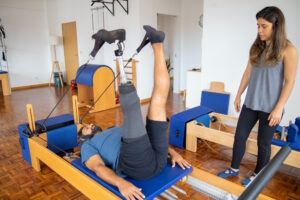
Welcome to the world of Pilates in Rehabilitation! As the foremost expert in this field, I am delighted to shed light on the numerous benefits that Pilates can offer during the rehabilitation process. Pilates is a versatile and effective exercise method that has been widely embraced by healthcare professionals to aid in the recovery and rehabilitation of individuals with various injuries or physical limitations. In this comprehensive guide, we will explore how Pilates can help with rehabilitation, the concept of rehabilitative Pilates, and the suitability of Reformer Pilates for the rehabilitation journey.
How does Pilates help with rehabilitation?
Pilates is a holistic exercise approach that addresses the body as a whole, making it particularly beneficial for rehabilitation. Let’s delve into some of the ways Pilates can help individuals on their road to recovery:
1. Core Strengthening and Stability: One of the key components of Pilates is the focus on core strength and stability. The core muscles, including the abdomen, back, and pelvic floor, act as a support system for the spine and limbs. Strengthening these muscles not only helps in maintaining proper alignment but also contributes to improved posture and reduced strain on injured areas.
2. Flexibility and Range of Motion: Pilates exercises involve controlled and gentle movements that promote flexibility. For individuals recovering from injuries, surgeries, or prolonged periods of immobility, Pilates can help restore and enhance range of motion in affected joints and muscles.
3. Muscle Imbalance Correction: Injuries often lead to muscle imbalances, where some muscles become weak and others overly tight. Pilates targets specific muscle groups, addressing these imbalances and helping to restore the body’s natural muscle equilibrium.
4. Low-Impact Exercise: Pilates is a low-impact form of exercise, meaning it places minimal stress on the joints. This characteristic makes it a safe and accessible option for individuals with joint issues or those who are unable to engage in higher-impact activities during their rehabilitation journey.
5. Mind-Body Connection: Pilates places a strong emphasis on the mind-body connection. Practitioners are encouraged to focus on their movements, breathing, and alignment, promoting mindfulness and body awareness. This heightened awareness can help individuals identify and correct movement patterns that may be contributing to their injuries.
6. Pain Management: Pilates can be an effective tool in managing pain associated with certain injuries or conditions. By strengthening supportive muscles, improving posture, and increasing flexibility, Pilates can help alleviate discomfort and contribute to overall pain relief.
What is rehabilitative Pilates?
Rehabilitative Pilates, also known as Clinical Pilates, is a specialized approach to Pilates that is tailored to meet the specific needs of individuals undergoing rehabilitation. Unlike traditional Pilates classes that may have a more general focus, rehabilitative Pilates is overseen by healthcare professionals, such as physical therapists or certified Pilates instructors with extensive knowledge of rehabilitation principles.
Rehabilitative Pilates sessions are designed based on the individual’s unique condition, goals, and progress. The exercises selected are carefully chosen to address the person’s specific injuries or physical limitations. The instructor provides hands-on guidance and ensures that movements are performed with proper form and alignment, minimizing the risk of injury and maximizing the benefits of the exercises.
This personalized approach sets rehabilitative Pilates apart, as it takes into account each person’s medical history, current condition, and any restrictions or precautions they may have. It is a collaborative effort between the individual, the healthcare professional, and the Pilates instructor to create a comprehensive rehabilitation program that supports the individual’s journey to recovery.
Is Reformer Pilates good for rehabilitation?
The Reformer is a popular piece of Pilates equipment that consists of a sliding carriage, springs, straps, and bars. Reformer Pilates can be highly beneficial for rehabilitation purposes due to several reasons:
1. Adjustable Resistance: The Reformer’s springs can be adjusted to provide varying levels of resistance. This feature allows for progressive rehabilitation, where individuals can start with minimal resistance and gradually increase it as they gain strength and mobility.
2. Support and Stability: The Reformer’s carriage and straps provide support and stability during exercises, which can be particularly beneficial for individuals with balance issues or those who need extra assistance during their rehabilitation process.
3. Eccentric Muscle Training: The Reformer allows for eccentric muscle training, where muscles are lengthened while under tension. This type of training is valuable for strengthening muscles in a controlled manner, which is essential for injury recovery.
4. Range of Motion Enhancement: The Reformer’s sliding carriage facilitates smooth and controlled movements, promoting joint mobility and range of motion. This is especially useful for individuals with restricted movement due to injury or surgery.
5. Versatility: The Reformer offers a wide range of exercises that can target various muscle groups and movement patterns. This versatility allows for a comprehensive and customized rehabilitation program.
It’s important to note that while Reformer Pilates can be excellent for rehabilitation, it should be performed under the guidance of a certified Pilates instructor or healthcare professional experienced in rehabilitative Pilates. Proper form, progression, and individualized modifications are crucial to ensure a safe and effective rehabilitation experience.
Summary
In summary, Pilates offers numerous benefits for individuals undergoing rehabilitation. Its focus on core strength, flexibility, muscle balance, mindfulness, and low-impact movements makes it a valuable tool in the recovery process. Rehabilitative Pilates, personalized to meet individual needs, provides targeted exercises overseen by healthcare professionals or certified Pilates instructors. Reformer Pilates, with its adjustable resistance, support, and versatility, is especially effective for rehabilitation when guided by knowledgeable instructors. Incorporating Pilates into a rehabilitation program can contribute to improved physical function, pain management, and overall well-being as individuals progress on their journey to recovery.